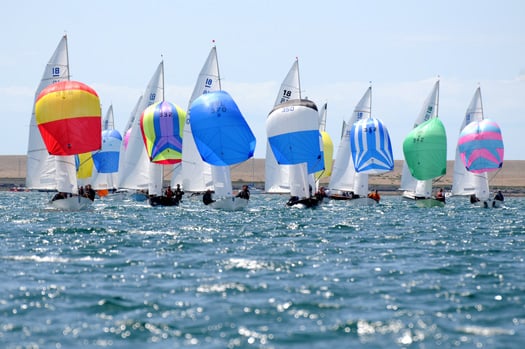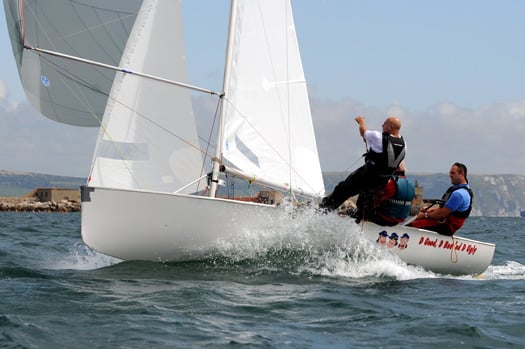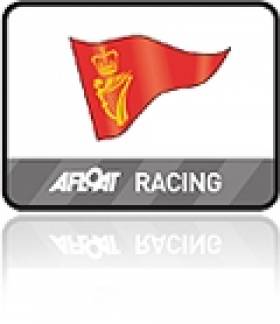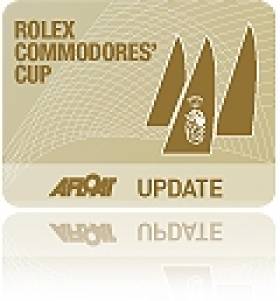Displaying items by tag: Dick Gibson
Royal Cork Aims for Biggest Ever National 18 Turnout
The Royal Cork YC aims to host the largest ever gathering of National 18's this summer. The 2011 class championship, better known locally as the Cock O' The North, will take place at RCYC in Crosshaven from Sunday 24th to Friday 29th July. In excess of 50 boats are expected to participate. Latest Royal Cork News here.

The class has roots all over Ireland and the United Kingdom. Traditionally the event sees entries from Scotland, London, Cork and Isle of Man. While strong numbers will travel as always from those centres, a feature of this year's event is the addition of entries from Lymington, Gloucester, Swansea, Lough Derg, Lough Neagh, Waterford, Schull, Ballydehob and Baltimore.
The event will cater for all National 18s whether old or new. The fleet will have three distinct divisions at this year's championships. The modern fleet will be known as Ultimate's, with the older fibreglass boats going into the Penultimate division while the original wooden clinker boats will race in the Classic division.
At the front of the ultimate fleet the competition will be intense with Anthony Ellis and crew from the Isle of Man doing their best to retain the crown that they won on home waters last season. However they will face a huge challenge with the likes of Colin Chapman, Nick Walsh and Tom Crosbie from the host club as well as the Barry brothers, Colin and Ewen from Monkstown Bay.

In the penultimate's class the fleet is seeing many older fibreglass boats being refurbished and brought out for the event. Expect to see Willie Healy on 'Break Even' and Grattan Roberts on 'Manniken P' feature strongly.
While the intention among the classics is that racing will not be as intense this division expects to see approximately ten boats from both home and abroad. Wolfgang Felder is travelling from Germany to participate alongside well known Cork sailors like Dick Gibson, Dan Cross and Tom Kirby. An interesting piece of history is that John Murphy of Baltimore SC will race in 'Tornado' which was the first winner of the Cock O'The North back in 1952.
Many former 18 sailors are making their way back to the class in recent times. The likes of John Crotty, Patsy O'Mahony and Bobby Kerr are expected to make it to the start line for this season to add a further element of experience to the fleet.
Among the many trophies to be raced for will be two trophies originally won by the late Richard Lane in Doldrum at the 1961 Championships sailed at Mumbles. The Lane family has kindly donated the trophies to the class and they will be raced for 50 years after Doldrum swept the board at the Welsh venue. While there has been no 18 activity at Mumbles in recent years it is expected that a crew from the club will race this year after the launch of a new pilot project by the class to stimulate 18 sailing in Wales.
Another interesting note to this event is the recent approval of carbon fibre masts and with up to 20% of the fleet already having switched over, eyes will be focused on any improved performance.
Like any good sailing event as much effort has been put into the social aspect. A full week's social programme has been planned ranging from a Christmas party to the Class Dinner. The Class Dinner will also serve as a reunion for former 18 sailors and it is expected that 300 people will attend what will be an historic occasion. All this sailing and socialising is thirsty work and so the class has commissioned a special beer for the week to be known as 'Cock a Doodle Brew' to mark the event.
For more information on the event go to www.national18.com.
Ireland's 1978 Commodores' Cup Victory Remembered
As Irish sailing prepares to honour the team that brought the Commodores' Cup home after a ten year wait, the fact Ireland previously won the Cup 32 years ago will be news to many involved, wrote David O'Brien in last Friday's Irish Times Sailing Column.
It turns out a single Irish Team won the Cup in 1978 beating an English team, the only other entry that year. (See Jack Connor's note below).
What amounts to a lost chapter in the history of the cup reveals Ireland's long standing love affair with the top prize in cruiser-racing.
The 2010 achievement is being celebrated on November 13th at the Irish Cruiser Racer (ICRA) Conference in Cork and at a gala dinner in honour of the team at the Royal Cork Yacht Club in Crosshaven that same night.
After mounting multiple teams, considered favourites going into both the 2006 and 2008 events but failing to win either, the Royal Cork boats Antix, Marinerscove.ie and Roxy VI secured the Cup in August.
After first being jilted by the French and twice by the English, the Irish could be forgiven for giving up on the cup but we never did.
The win is the highlight of the sailing year and it is the centrepiece of an action packed conference that will reflect on a job well done, the same as in 1978.
Back then the Commodore's Cup was also staged in Cowes. It was hosted by The Royal Corinthian Yacht Club and sponsored by John Haig, Scotch Whisky.
Only two teams registered, Ireland and England, so it became a match racing event. The teams consisted of a One Tonner, a Three Quarter Tonner and a Half Tonner in the existing rating bands of the day.
The Irish team consisted of Jack Connor's Sheer Magic, from Carrickfergus, Poppy, a contention 33, on charter from John Deans to Pat Donovan and Silver Shamrock skippered by Harry Cudmore.
The English team consisted of Green Highlander, Samsara and Red Hot Granny.
Crew line-up included Cork sailmakers John and Des McWilliam and Dick Gibson.
The races consisted of three inshore races, one middle distance and the event culminated in a Channel Race, similar to today's event.
Skipper Jack Connor says "I remember all the details as the sponsor had put up a prize of a gallon bottle of whisky to the winner of each class for each race! We won two, I still have one of the bottles, but Harry and his crew of four others won every race, that's five one gallon bottles of Haig!
It's a seldom heard story that is certain to be applauded again in Cork next month and one that should renew efforts to bring the Cup home for a third time.
1978 Commodore's Cup Winner Jack Connor writes:
I have recently read of the success of our national team in the Commodore' Cup event, and I whole heartedly congratulate all involved. I do not wish to knock the wind out of any sails but I would point out that the Commodore's Cup was won by Ireland in 1978! The event was staged in Cowes, hosted by The Royal Corinthian Yacht Club and sponsored by John Haig, Scotch Whisky. Two teams registered, Ireland and England so it became a match racing event. The teams consisted of a One Tonner, a Three Quarter Tonner and a Half Tonner in the existing rating bands. the Irish team consisted of Sheer Magic,from Carrickfergus, my boat, Poppy,a contention 33, on charter from John(?) Deans to Pat Donovan and Silver Shamrock skippered by Harry Cudmore.
The English team consisted of Green Highlander, Tom Chadwick; Samsara, Odile Van Trom or Dom(I think); and Red Hot Granny, or Gonnagetcha. There was one French boat turned up at the marina, but it did not take part.
I remember all the details as the sponsor had put up a prize of a gallon bottle of whisky to the winner of each class for each race! We won two,i still have one of the bottles, but Harry and his crew of four others won every race! 5 one gallon bottles of Haig's!!!
Ireland won the event and we were presented with the Commodore's Cop trophy, a Gold Cup which had been donated by two well known sailors of the time (I do forget their names- sorry).I believe it is the same trophy.
The races consisted of three inshore races, one middle distance and culminated in the Channel Race. We had enlisted the help of John McWilliam and Dick Gibson from the McWilliam sail loft as crew and I recall Des joined us for the Channel Race.It was hard to get time off work in those days.
It was our first time in the "Big League" of sailing and we enjoyed every minute of it.My memory of those times is still pretty good if anyone wants more information.
(there is an interesting story attached to Sheer Magic if anyone is interested.) Regards Jack Connor.






























































